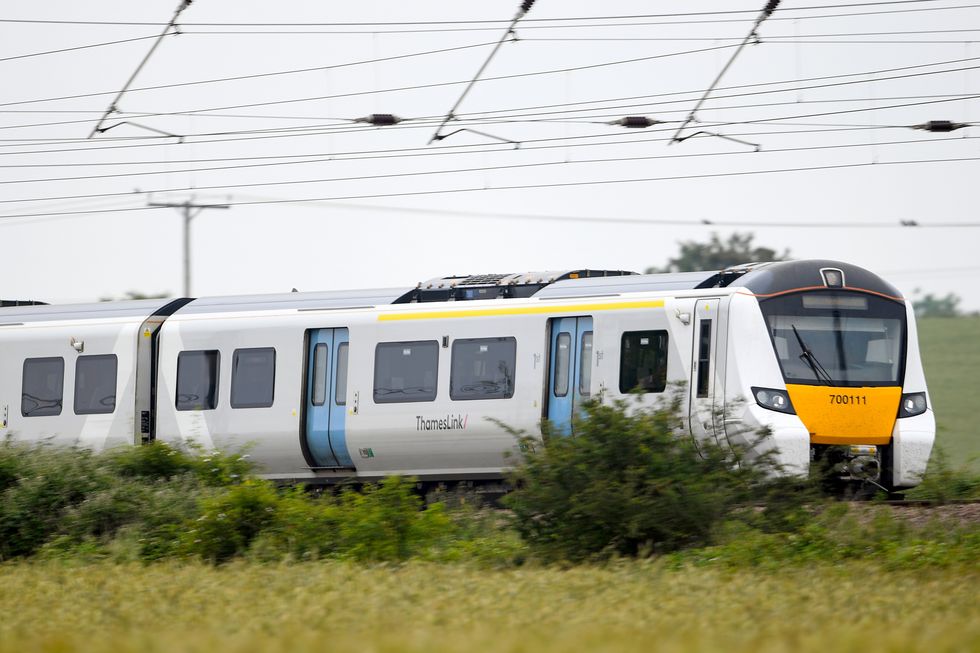London train evacuated: Hundreds of passengers walk along tracks as 33C 'heat hell' sparks travel chaos

Passengers were trapped inside a Thameslink service to Brighton for two hours
Don't Miss
Most Read
Trending on GB News
Hundreds of rail passengers were forced to abandon their trains and walk along the tracks near Loughborough Junction in south London on Saturday after services ground to a halt during the year's hottest day.
The incident affected multiple Thameslink services, leaving travellers stranded without power or air conditioning as temperatures soared above 33C.
Social media footage captured the extraordinary scenes of passengers filing along the railway tracks beside stationary trains.
The evacuation came after some travellers had endured up to two hours trapped inside sweltering carriages, prompting angry complaints about the handling of the situation.
Angela Lewis, who was among those affected, posted a video on X showing passengers gathered outside Loughborough Junction, writing: "After nearly two hours on the stuck train to Gatwick we are abandoned outside."
She later added: "Was it entirely necessary to keep us waiting nearly two hours in stuck in an overheated carriage for that? we should have been out within 30 minutes max."
Another frustrated passenger wrote to Thameslink: "You will have hell to pay. We've been stuck on this hot and humid train for over an hour."
Thameslink responded that the train would be "getting evacuated shortly" and asked passengers to wait for response staff to establish a safe evacuation route.
LATEST DEVELOPMENTS:
A screenshot of passengers walking along the tracks
|Footage also showed a Just Eat driver hurling bottles of water up to the tracks as passengers became increasingly dehydrated in yesterday's heat.
Passengers were heard cheering and clapping as the bottles ended up in the Thameslink carriage.
Thameslink acknowledged the severity of the situation, with a spokesman stating: "Earlier today, a fault on a train near Loughborough Junction brought all services to a halt in the area, three of them outside station platforms."
The company explained that the loss of power and air conditioning on such an exceptionally hot day prompted them to mobilise resources from across Sussex and Kent to facilitate passenger evacuations.

A stock image of a ThamesLink train
| PA"This would have been a difficult and uncomfortable experience for our passengers and we are truly sorry," the spokesman added.
Both Govia Thameslink Railway and Network Rail issued apologies for the significant disruption caused to travellers.
The Met Office confirmed that Surrey recorded provisional temperatures exceeding 33C, officially marking Saturday as 2025's hottest day to date.
The extreme heat coincided with a yellow warning for thunderstorms affecting south-east Scotland, Yorkshire, the Midlands and Wales from Saturday evening until 3am Sunday.

A JustEat driver hurls drinks up to the stuck train
|Forecasters warned that up to 40mm of rain could fall within two hours, urging residents in affected areas to prepare for potential flash flooding.
An amber heat-health alert, the first issued by the UK Health Security Agency since September 2023, remained in effect across all English regions throughout the weekend.
Skyrocketing temperatures has also led National Rail to release advice to travellers about how services could face further disruption.
In its advice update to customers, National Rail said: "Please check before you travel and allow more time for your journey, as trains may be affected by weather related incidents.

Loughborough Junction train station is pictured in south London
|GETTY
"Please also carry water with you - you can find water refill stations at all Network Rail managed stations and some other larger stations.
"If you feel unwell at the station, please don't board a train, please seek assistance from station staff or use the Help Point.
"There are currently no weather related disruptions reported.
"Any further disruptions related to heat or extreme weather will be published here once we have more information.
However, disruption experienced this morning was predominantly related to engineering works rather than weather conditions.
More From GB News











